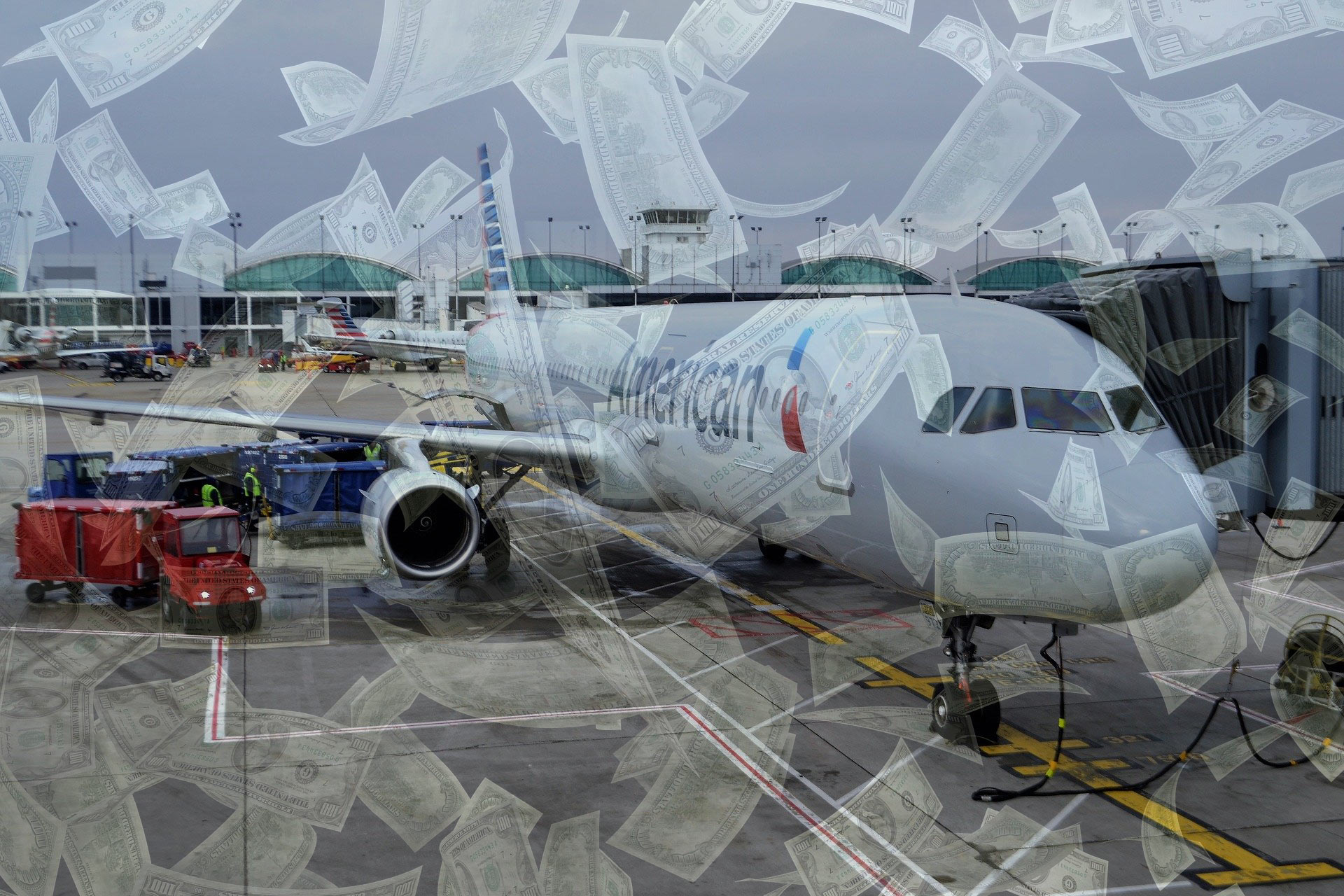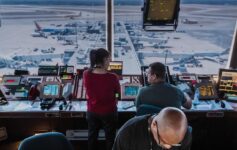
It only took the passage of a $1.9 trillion economic relief passage including tens of billions of dollars in airline subsidies, for a New York Times opinion to question the wisdom of such spending.
A Critical Look At Airline Bailouts In The New York Times
The piece comes from the always-feisty Andrew Ross Sorkin in his DealBook column.
He notes the upside to bailouts:
- 75,000 jobs saved
- Kept airlines from filing bankruptcy
- Kept airlines operational, which will jumpstart growth as the pandemic subsides
But the downside: these jobs have cost over a million dollars EACH to save. For only one year!
I never knew the airline industry was lucrative. It seems the workers don’t either…
Sorkin notes how much airline executives and stockholders have benefited from bailouts:
“The truth is that shareholders of the airlines have been the biggest beneficiaries. That includes airline executives, many of whom have been paid in stock for years and stood to lose millions of dollars if their holdings were wiped out. Airline chiefs collected tens of millions per year in compensation before the pandemic, in part by boosting their companies’ share prices by regularly buying back tens of billions in shares. That meant setting aside less money for a rainy day — or, in this case, a pandemic.”
He also notes that airline stocks have recovered much of their pandemic losses.
“It is fair to say that we socialized the airline industry’s losses and largely privatized the gains.”
And then he asks, was this really necessary?
“The question isn’t whether airline employees should have been helped, it’s whether airline shareholders should have been. The airline bailouts weren’t simply a job-protection program, as advertised. In case you’re not convinced, there’s this: United invested $20 million into an electric helicopter company last month that went public through a special purpose acquisition company, or SPAC. Does that sound like a company that is in such dire straits that it requires a taxpayer-funded bailout? It received a third rescue payment after it made the investment.”
It’s a well-argued point. I’d say the only point he glosses over is that government intervention (particularly lockdowns) destroyed the airline business in 2020. But guess what? Lockdowns destroyed or severely hurt a number of businesses, including all three of mine.
Am I bitter over this? Yeah, guilty as charged…and I even to stand to benefit from the airline bailouts, hopefully by more travel stories to write and more clients to consult.
But I’m not just a blogger or a luxury travel advisor. I’m an American taxpayer with two young children. I sounded this alarm early on and I am disgusted today.
I read all the regulatory filings and see what is going on behind the scenes with airline executives buying and selling airline stock. It’s payday.
Sure, we’ll still have our airlines to ferry us around. With devalued frequent flyer programs. And limited service onboard due to “safety” concerns. And surly employees who are more scared of a baby without a mask than the fact that their babies and grand babies will be saddled with a staggering debt bill.
Anyway, it’s nice to see Sorkin and the New York Times join the team questioning the wisdom of airline bailouts. But it’s a little late…




Unless I misread (potentially possible) is one of the conclusions here that all that money just to prop up jobs is being looked at by taking the “bail out” money and dividing it by the number of jobs saved?
Seems a bit odd no? What about payments to facilities, aircraft financing/leasing, and the other long list of expenses that need support to be covered, in order to keep those jobs (and the even bigger number of jobs directly related to the functioning of an airline that are not employed by the airline directly) in place.
Not sure I understand that way of looking at it. Isn’t that the same as saying, the police gets X amount of spending per year divided by X officers = wow aren’t officers expensive! ……or am I missing something?
The bailouts, under the CARES Act, were directed to avoid layoffs, not fund general expenses. All those costs you mention would have been incurred without or without the employees who were furloughed.
@ Matthew — Why do we always question the theft of money from taxpayers only after the fact? NONE of the outrageous Fed or fiscal policies should have been adopted. Markets should have collapsed, companies should have failed, and people should have lost their homes. It is called a recession. Then, we could have had a real recovery that would reward people wiling to take on real risks, like starting a new business or buying a foreclosed home. Instead, once again, high risk takers were rewarded for their failures and everyone else was screwed over. Avoiding a real recession has destroyed American capitalism and resulted in a widening of the wealth gap in this is country. It is a disgrace and a tragedy of epic proportion.
It’s a sad state of affairs.
I’m wishing someone would explain to me why this was not handled in the same way the auto manufacturer bailout was done in 2008-09. That is that they actually had to (and did) pay everything back with interest. Everyone won.
Exactly. Sorkin mentions this in his piece as well.
But how do you avoid layoffs by just paying salary only? Don’t you need to help to cover other expenses? If the airline doesn’t have the cash flow to pay for general expenses as they can’t generate the revenue to cover it, then it will lead to lay offs as they are forced to shrink significantly and lay people off?
Again, I’m not necessarily disagreeing with your analysis, just the language of the CARES Act. Still, the government could have paid them their full salaries and forced the airlines to restructure or taken a huge stake in them, like GM, until taxpayers were paid back.
This was a once in a century cataclysmic event that no executive could have planned for. Even if the airlines had larger rainy day funds, the money would not have been sufficient and you well know that shareholders would not have stood for large piles of cash being held in reserve – it’s just not how modern business operates.
As a member of the managerial/professional class (the people who earn their high incomes primarily through salary and pay the highest percentage of their income in taxes of any group), I am happy for the CARES Act. Money well spent. I am happy to fund the most recent COVID relief package, even though most of the benefits phase out well before my income level.
Ok understood. A structure like Lufthansa Group where it was around loans with interests (and bank guarantees) and payroll support (as available to the rest of businesses in the countries involved) would have made more sense than just handing over money.
If you think this has ended, you are sorely mistaken. These subsidies are going to continue as long as the Dems give handing out free money to anyone who asks. The latest bailout package gave them even more money.
Capitalism works. All the systems are already in place to solve these issues without taxpayers having to do bailouts. Airlines are in trouble, they go get loans or raise funds, if they can’t secure funds they file bankruptcy or close, creating space in the market for others to grow. Part of capitalism is failure, somehow we’re trying to take that out of the equation.
And for anyone saying this is a freak event, huge economic events seem to happen every 10 years or so making them somewhat predictable.
The New York Times rarely has a good and honest article. This article was the rare exception.
Government destroys almost all that it touches. It decreed the stupid lockdowns and then acts to “save” those it damaged. But the result is money spend on stupid bailouts.
What a waste of taxpayer money.
I assume you got some PPP money. To be fair in your article, you should write that. If you didn’t, why not?
Dude, what is it with you? I saw your comment in Ben’s story. Do you have any idea how much he has traveled during the pandemic? You just don’t like that I blog about it. My PPP is public information. I noted above that I support payroll support for employees. 100% of my meager payment went to payroll. Totally different case when airlines are bailed out far, far beyond payroll needs to fund projects like carbon capture or electric helicopters. Any other questions?
Point by point:
I don’t have any idea how much Ben has traveled, but that was exact the point of my comment on Ben’s blog. He didn’t glorify his travel. I don’t know how many times he traveled transatlantic, but I’m guessing once round-trip because that was all that I can tell from his blog.
Yeah, I didn’t think your travel last year was responsible. On top of that, I thought it was misleading to your readers because you didn’t mention that you already got Covid and therefore had antibodies. [Ben noted he never got covid, and it doesn’t sound like he is vaccinated yet, despite Texas haven’t very few restrictions.]
Thats great that your “meager” taxpayer funded payment went to payroll. But money is fungible — what would you have done without that payment? Would you have not paid them? It does seem like your business is operating (maybe at a reduced capacity) so you aren’t akin to a restaurant that was completely shut down.
I agree that airlines received an excessive bailout. What’s even more disappointing is that our bankruptcy system could have handled an airline bankruptcy without grounding the industry. Our miles would have survived, and there would still be plenty of flights. But we have a govt that rewards lobbyists, and the airline industry has some good ones.
Going back to travel during the pandemic:
How many times have you traveled transatlantic round-trip? Has your travel been essential? Or have you taken liberal use of your eligibility to reside on both sides of the Atlantic? When countries made exceptions to their entry requirements for their own citizens/legal residents, the policy rational was so that citizens/legal residents could return home. Has your travel been consistent with that policy?
Can you say that you have always abided by all Federal, state and local laws during the past year? And all requirements set by the businesses that you use, such as your kid’s school. If no, isn’t that inconsistent with your duty as a lawyer?
Here is a hypothetical question for you — if Germany’s vaccine program ran like clockwork, and you were eligible for a vaccine in Germany weeks before you could have gotten it in the US, would you have flown to Germany to get it, cutting in front of a German resident? Would you have blogged about it?
Dear Matt,
I enjoy your articles and generally agree with you, but as a major airline Captain, I must take respectful exception to your opinion on this matter. First off, I understand the public’s frustration with taxpayer funded bailouts…especially when so many jobs have been lost as a result of this pandemic. My heart truly goes out to everyone who has been impacted. The simple fact of the matter is that this money will have to be repaid and is thus not really a bailout. Yes, it went to payroll support, but that money would have otherwise come out of the coffers of the various airlines, so the money that was saved on payroll expenses went to ensure the survival of the airline, itself. Most airlines, mine included, were losing over 100 million dollars a day at the start of the pandemic, and by anyone’s measure, those numbers are not sustainable. You can’t simply file for chapter 11 when you have no money in the bank or, at least during a pandemic, when there is no real plan or timeline for a return to profitability and being able to pay back the DIP financing required in a Chapter 11 filing. It would have been a very short journey for most airlines into Chapter 7 liquidation, and the US would have been without an airline industry…no way to deliver goods, and vaccines in a time critical manner during these extraordinary times. Most every other country recognized the same thing and responded with similar measures for their national airlines. Back to the payroll support programs, the intent by both the government and the airlines was to use the money to keep employees getting a paycheck so that they could pay their mortgages, bills, and continue to support the economy by buying goods and services. It is interesting to note that close to 30% of the US economy is tied up in some way shape or another with the transportation sector…directly, and indirectly, through vendors, suppliers, etc. Thus, this loan program made sense to keep the economy, at large from suffering even more damage that what it already has. Again, I understand the frustration that a lot of people who did not receive the benefits of these bailouts must be feeling.
It is easy for the NYT writer to say the program was unnecessary when the industry has survived and there is light at the end of the tunnel, but at the time, the skies were truly dark and threatening the very existence of the industry.
To my airline, you mentioned the 20 million dollar investment in these electric helicopters…believe me, this was questioned rigorously by my fellow pilot group. The simple fact, and one that this reporter conveniently ignored, is that no money has been spent on this project at all. There are a lot of very specific terms that must be met before the funds are actually released…and none will take place for another several years…long after these “bailout” funds are repaid. The same holds true for stock buybacks. I think the era of “shareholder value” is gone for a long time to come.
The industry will recover, service will return and at the end of the day, we can thank the generosity of the American taxpayer for making this loan to ensuring a critical component of our nation’s economy survives. To each and every one of you, you have my sincere and heartfelt gratitude. I’d also like to qualify all my statements in my response…I have been flying throughout this pandemic and have not been on the receiving end of these funds, directly, but they have ensured that my airline has survived, so for that, I am eternally grateful.
Finally, I would like to offer my apology for the treatment that you received on that “mask flight in question.” I can only hope this kind of behavior is dealt with in an appropriate manner by the right people on the airline. This flight attendant appears to have been wrong on so many levels, but I also understand that there are always two sides (at least) to every story. At the end of the day, it is not her call to make, insofar as calling law enforcement or the response, in general…it is up to us, as Captains. Period. She has zero authority in this matter.